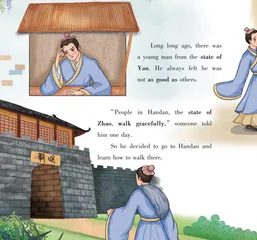Learning to Walk邯郸学步
作者: 玉兰

Long long ago, there was a young man from the state of Yan. He always felt he was not as good as others.
“People in Handan, the state of Zhao, walk gracefully,” someone told him one day.
So he decided to go to Handan and learn how to walk there.
When he arrived in Handan, he started to watch the people carefully. Everyone walked in a different but graceful way.
A little boy skipped down the street. The young man at once imitated him from behind.
Then, an old man came slowly. The young man imitated him from behind at once.
He imitated one person’s steps and then another one’s.
A few days passed. The young man still couldn’t learn any walking style. “Maybe I should forget my walk first. Then I can learn the new one,” he thought.
“邯郸学步”这个成语比喻一味生硬地模仿别人,不仅学不到人家的本领,反而把自己原来的本事也丢了。
as good as和……一样好
as ... as意为:和……一样,中间可以加形容词、副词的原形。在否定句中,第一个as也可以换成so。如:
He is as tall as his brother.他和他的兄弟一样高。
Emily jumped as high as Tyler.艾米丽跳得和泰勒一样高。
walk gracefully走路姿势优雅
graceful /ˈɡreIsfl/ adj.优雅的;gracefully /ˈgreIsfəlI/ adv.优雅地。副词修饰动词,放在动词后面。
如:jump high跳得高 run quickly跑得快
watch carefully观看得仔细 sing beautifully唱得好
arrived in到达
①arrive in+大地点(≥城市,比如:城市、国家等)
②arrive at+小地点(<城市,比如:商场、车站、机场等场所)
③get to+地点(无论地点大小均可)
④reach+地点(无论地点大小均可)
arrive at the bus stop
=get to the bus stop
=reach the bus stop
arrive in Shanghai
=get to Shanghai
=reach Shanghai
skip /skɪp/ v.跳跃(过去式:skipped)
imitate /ˈɪmɪteɪt/ v.模仿
crawl /krɔːl/ v.爬行